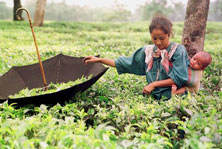|
| |

Tea Plantation
Tea is, of course, Darjeeling's most famous
export. From its 78 gardens, employing over 40,000 people, it produces the bulk
of West Bengal's crop, which is almost a quarter of India's total.
The tea from some of these estates is of very high quality.
The world record for the highest price paid for tea is held by some fine leaves
from the Castleton Estate in Darjeeling, for which a Japanese bidder paid US$220
per kg!
Although the area has just the right climatic conditions for
producing fine tea bushes, the final result is dependent on a complex drying
process. After picking, the fresh green leaves are placed 15 to 25 cm deep in a
'withering trough' where the moisture content is reduced from 70% to 80% down to
30% to 40% using high-velocity fans. When this is completed, the withered leaves
are rolled and pressed to break the cell walls and express their juices onto the
surface of the leaves. Normally two rollings at different pressures are
undertaken, and in between rolls the leaves are sifted to separate the coarse
from the line. The leaves, coated with their juices, are then allowed to ferment
on racks in a high-humidity room, a process which develops their characteristics
aroma and flavour. This fermentation must be controlled carefully since either
over or under-fermentation will ruin the tea.
This process is stopped by passing the leaves through a dry
air chamber at 115° C to 120° C on a conveyer belt to further reduce the
moisture content to around 2% to 3%.
The last process is the sorting of the tea into gardens. In
their order of value they are: Golden Flowery Orange Pekoe (unbroken leaves),
Golden Broken Orange Pekoe, orange Fannings and Dust (the latter three
consisting of broken leaves).
In the last few years modern agricultural practices have been
brought to the tea estates to maintain and improve their viability. The tea
plantations were one of the first agricultural enterprises to use clonal plants
in their replanting scheme, though most of th e tea trees are at least 100 years
old and nearing the end of their useful of even natural lives. The ageing plants
and deteriorating soil causes grave concern, since tea not earns the country
valuable export revenue, but also provides much employment in the area. With the
collapse of the USSR the Darjeeling tea planters lost their best customers and
have had to look for new markets. Some have simply switched to growing cardamom,
which is more profitable. There's not a big home market for Darjeeling; most
Indians prefer the stronger Assam variety. e tea trees are at least 100 years
old and nearing the end of their useful of even natural lives. The ageing plants
and deteriorating soil causes grave concern, since tea not earns the country
valuable export revenue, but also provides much employment in the area. With the
collapse of the USSR the Darjeeling tea planters lost their best customers and
have had to look for new markets. Some have simply switched to growing cardamom,
which is more profitable. There's not a big home market for Darjeeling; most
Indians prefer the stronger Assam variety.
The most convenient plantation to visit is the Happy Valley
Tea Estate; only two km from the centre of Darjeeling, where tea is still
produced by the 'orthodox' method as opposed to the 'Curling, Tearing and
Crushing' (CTC) method adopted on the plains. However, it's only worth going
when plucking is in progress (April to November ) because it's only then that
the processing takes place. It's open daily from 8am to noon and 1 to 4.30 pm,
except on Monday and Sunday afternoon. An employee might latch on to you, whisk
you around the factory and then demand some outrageous sum for his trouble.
|